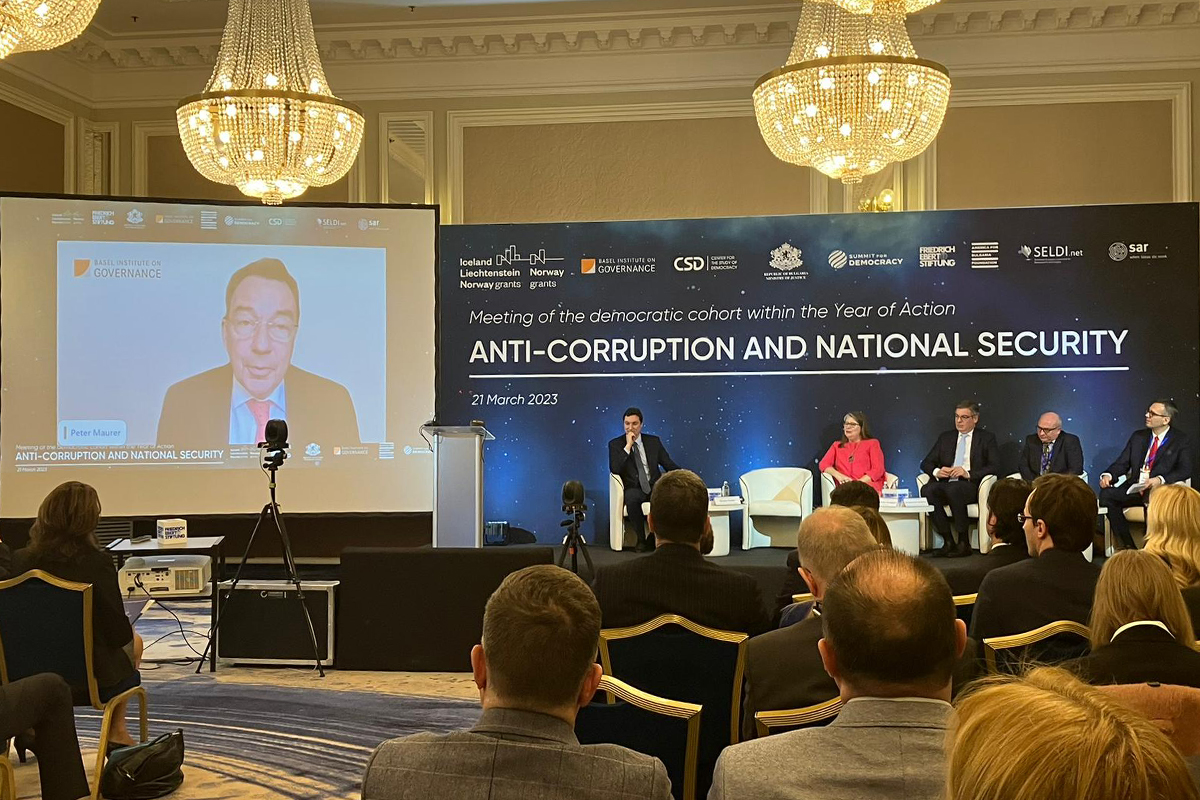Fighting corruption for global peace and stability – Peter Maurer's speech at Summit for Democracy event in Bulgaria

In a speech at the Anti-Corruption and National Security policy forum in Sofia, Bulgaria, the Basel Institute's President Peter Maurer commended how the Summit for Democracy is finally putting corruption at the centre of the debate about global peace and stability. He called on leaders in government, civil society and the private sector to work together to turn their commitments into action.
The event was co-hosted by the Ministry of Justice of Bulgaria, the Basel Institute on Governance and the Center for the Study of Democracy. The three institutions co-lead the Summit for Democracy's Democratic Cohort on Anti-Corruption Policies.
Peter Maurer's address followed opening remarks by Bulgaria's President Rumen Radev and short speeches by other leading voices on anti-corruption, peace and democracy.
President Radev
Honourable Ministers
Excellencies
Ladies and gentlemen, dear colleagues
It is my pleasure to address this distinguished audience of political leaders, policy makers and practitioners that have gathered in Sofia.
I wish to start by thanking the Government of Bulgaria for bringing us together and for leading this important cohort on anti-corruption policies in the context of the Summit for Democracy.
The Summit for Democracy has kickstarted valuable discussions about the challenges that lie at the heart of some of today’s most pressing global issues. This engagement is particularly welcome at a time when multilateralism is under severe stress.
At the Basel Institute, we appreciate the fact that corruption has been recognised as central to this debate.
For too long, corruption has been treated as a technical problem to be solved by experts and limited to development contexts.
By putting corruption squarely at the centre of the debate about global peace and stability, we are finally recognising its global dimensions. And we are acknowledging that technical solutions are not enough, but rather need unwavering political leadership at the highest level to stand a chance to reduce the devastating effect that corruption has on our world.
And this is what is important about today’s event:
Firstly, that it is bringing together political leaders from countries of the region to commit to implementing more effective anti-corruption policies.
Secondly, that the countries represented today are committed to working together in the region and with countries from across the world.
Corruption is not a problem of the few and it is not only a local phenomenon.
I would like to briefly reflect on the example of Bulgaria, with which we have worked for over a year now on strengthening its anti-corruption policy framework. In line with its aspirations to join the Schengen Area, the Eurozone and OECD, we have seen important multi-party efforts resulting in the adoption of the Whistleblower Protection Act, as well as numerous other initiatives which are under way.
As we commend Bulgaria for these important efforts, we need further discussions on the way forward and how to leverage anti-corruption measures for a more equitable distribution of public resources, better quality of public services, safer roads, healthier businesses, and ultimately, higher trust in our public institutions and in the fundamental principles of democracy.
At the same time, I want to emphasise that adopting laws and policies is not enough. It’s the implementation gap that has been slowing us down and which should be the focus of this gathering.
What does that mean?
- We need to resource the responsible agencies properly.
- We need to ensure they can operate independently and without interference and that staff do not have to fear reprisal or intimidation for doing their jobs.
- Beyond that, it is vital that we implement the policies transparently and that we give civil society and the media the space and information that they need to be critical partners and play their role.
- We also need to bring the private sector more prominently into our discussions. I am glad to see that we have a session later today dedicated to Collective Action and private-sector engagement. The best chance to growing our countries is through clean investments, fair competition and evidence-based innovation.
The anti-corruption cohorts under the Summit for Democracy are an excellent illustration of the importance of multi-stakeholder engagement to combat corruption. The leaders of the two cohorts that we have supported – Bulgaria and Moldova – have both demonstrated foresight by reaching out to partners from civil society and academia in the very early stages of the Year of Action.
In Bulgaria, this was the case with initial partners from the Office of the Prime Minister and now with the Ministry of Justice and our esteemed colleagues from the Center for the Study of Democracy. In Moldova, we have had the privilege of working alongside the Office of the President and the National Anti-Corruption Centre, together with our longstanding partners from Transparency International.
In both cohorts, we have engaged in a truly collaborative effort, I would like to express our sincere thanks to our partners for this.
With the Basel Institute on Governance, we remain committed to working with partners, in building resilient networks against corruption and thus pathways to a safer, more prosperous and more equitable future.
Once again, let me express our appreciation to the Government of Bulgaria and our partners for bringing us together today. I wish you fruitful deliberations and look forward to hearing back from my team how we can take commitments forward into action.
Thank you.
Learn more
- See more information about anti-corruption under the Summit for Democracy
- Watch a short video produced by the two anti-corruption cohorts: Anti-Corruption Policies and International Cooperation for Anti-Corruption. It features short statements by the co-leaders:
- Gretta Fenner, Managing Director, Basel Institute on Governance
- Krum Zarkov, Minister of Justice of Bulgaria
- Iulian Rusu, Director, National Anti-Corruption Centre, Moldova
- Ruslan Stefanov, Program Director, Center for the Study of Democracy
- Daniel Eriksson, CEO, Transparency International




